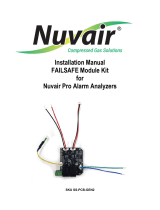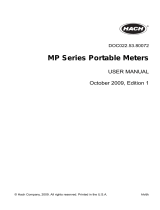1
CONTENTS
Section Page
1INTRODUCTION .............................................................. 2
1.1 System Description .................................................2
1.2 PID Control – AX410 and AX450 Analyzers Only ..... 2
1.3 AX400 Series Analyzer Options ............................... 2
2 OPERATION ..................................................................... 3
2.1 Powering Up the Analyzer ....................................... 3
2.2 Displays and Controls..............................................3
2.2.1 Membrane Key Functions ............................3
2.3 Operating Page ....................................................... 6
2.3.1 Single Input Conductivity..............................6
2.3.2 Dual Input Conductivity ................................7
3 OPERATOR VIEWS ......................................................... 9
3.1 View Set Points .......................................................9
3.2 View Outputs ........................................................ 10
3.3 View Hardware ...................................................... 11
3.4 View Software ....................................................... 12
3.5 View Logbook ....................................................... 13
3.6 View Clock ............................................................16
4 SETUP............................................................................ 17
4.1 Sensor Calibration .................................................17
5 PROGRAMMING ...........................................................19
5.1 Security Code ....................................................... 19
5.2 Configure Display ..................................................20
5.3 Configure Sensors.................................................21
5.4 Configure Alarms...................................................30
5.5 Configure Outputs ................................................. 34
5.6 Output Functions .................................................. 39
5.6.1 Bi-Linear Output ........................................39
5.6.2 Logarithmic Output (2-decade) .................. 39
5.6.3 Logarithmic Output (3-decade) .................. 40
5.7 Configure Clock ....................................................41
5.8 Configure Control ..................................................42
5.8.1 Configure Single PID Controller ..................43
5.8.2 Configure Power Failure Recovery Mode.... 46
5.9 Configure Security ................................................. 47
5.10 Configure Logbook ............................................... 47
5.11 Test Outputs and Maintenance ..............................48
Section Page
6INSTALLATION .............................................................. 50
6.1 Siting Requirements .............................................. 50
6.2 Mounting ...............................................................51
6.2.1 Wall-/Pipe-mount Analyzers .......................51
6.2.2 Panel-mount Analyzers ..............................52
6.3 Connections, General............................................53
6.3.1 Relay Contact Protection
and Interference Suppression..................... 54
6.3.2 Cable Entry Knockouts,
Wall-/Pipe-mount Analyzer .........................55
6.4 Wall-/Pipe-mount Analyzer Connections................ 56
6.4.1 Access to Terminals ...................................56
6.4.2 Connections ..............................................57
6.5 Panel-mount Analyzer Connections ....................... 58
6.5.1 Access to Terminals ...................................58
6.5.2 Connections ..............................................59
6.6 ABB Conductivity Sensor Systems Connections ... 60
7 CALIBRATION ...............................................................61
7.1 Equipment Required.............................................. 61
7.2 Preparation ........................................................... 61
7.3 Factory Settings ....................................................62
8SIMPLE FAULT FINDING .............................................. 68
8.1 Error Messages .....................................................68
8.2 No Response to Conductivity Changes .................68
8.3 Checking the Temperature Input............................ 69
SPECIFICATION .................................................................. 70
APPENDIX A ....................................................................... 73
A1 Automatic Temperature Compensation ................. 73
A1.1 Calculation of Temperature Coefficient ....... 74
A2 Relationship Between Conductivity and
Total Dissolved Solids (TDS) Measurement ............ 74
A3 Inferred pH Derived from
Differential Conductivity .........................................75
A3.1 Monitoring on Steam-Raising Plant ............ 75
A3.2 Monitoring on AVT Systems .......................76
A3.3 Monitoring on AVT Systems
with Impurities ............................................ 76
A3.4 Monitoring on Solid Alkaline
Treated Systems ........................................ 77
APPENDIX B ....................................................................... 78
B1 Single PID Controller ............................................. 78
B1.1 Reverse Acting Single PID Control .............78
B1.2 Direct Acting Single PID Control .................79
B2 Ouput Assignment ................................................ 79
B3 Setting Up Three Term (PID)
Control Parameters ...............................................80
B4 Manual Tuning .......................................................80






















